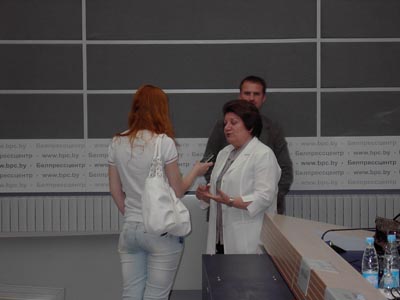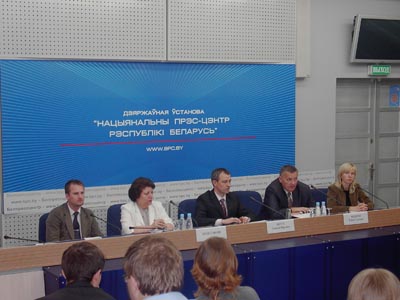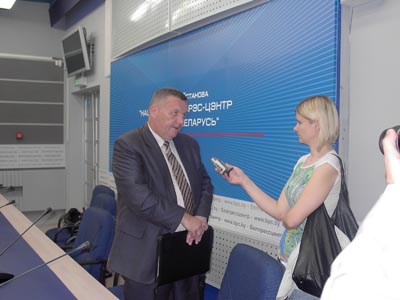Press-conference devoted to the World Refugee Day was held June 16, 2011 in the National Press-center of the Republic of Belarus.
Sholeh Safavi, UNHCR Representative in the Republic of Belarus, Alexey Begun, the Chief of the Department on Citizenship and Migration of the Ministry of Internal Affairs of the Republic of Belarus and Yuri Fedorov, Chief of the Department of International Cooperation of the State Border Committee of the Republic of Belarus, have taken part.
| Sholeh Safavi, UNHCR Representative in the Republic of Belarus, in her speech said, that UNHCR, the UN Refugee Agency, was born on 14 December 1950 by the UN General Assembly and became operational as of 1 January 1951. At that time, our job was to protect and find durable solutions for 1 million refugees within three years; now we are 60 years old and are caring for over 43 million refugees, returnees, internally displaced and stateless persons. At that time our job was confined to Europe; today we are working in more than 110 countries in five continents. It was because of the harsh realities of the world that already in 1970s, UNHCR had become a unique global organization mandated with the protection of refugees. The growing dimensions and complexity of forced displacement led the General Assembly to dedicate 20th of June to refugees in order to raise public awareness about the plight of displacement as well as to urge all states to respect the rights of refugees and to protect and assist them to rebuild their lives. |
This year’s World Refugee Day is of particular significance: It falls not only in the 60th anniversary year for UNHCR but also comes shortly ahead of the 60th anniversary of the 1951 Refugee Convention and 50th anniversary of the 1961 Convention on Reduction and Prevention of Statelessness. As a result, UNHCR and its partners are carrying out a series of commemorative events around the world. Similarly in Belarus, as in previous years, we and our partners in the government and civil society have organized a number of interesting events. For the sake of time, if you wish, we can give you details of these activities after the press conference. It must be of interest to the media that for June 20th, UNHCR is releasing its Global Trends report - our major annual statistical overview of the state of the world’s forcibly displaced.
UNHCR has also launched a global media campaign, called “1 Campaign” which will run until the end of the year. The idea behind the "1 Campaign” is to go beyond the statistics and tell the stories of individual refugees and to communicate to the public and our stakeholders and donors that there is NO tolerable level of displacement; that even 1 person forced to flee is 1 too many. As part of this, UNHCR's Goodwill Ambassador, Angelina Jolie, has released a Public Service Announcement asking the public to “do 1 thing” to help refugees. This “1 thing” could be anything: just read a refugee story and tell others about it; read UNHCR’s press release and inform yourself of the plight of refugees in the world; confront a person who equates refugees with burden or who spreads hatred towards migrants; contribute $1 of your monthly salary to any organization that helps refugees. We hope we can air Ms Jolie’s message on TV channels or in metro stations in Minsk. We also encourage the public to go to the campaign page on the global web site of UNHCR http://www.unhcr.org/do1thing and do 1 thing.
With the events unfolding in North and West Africa and the Middle East, the general public is reminded daily about the crude realities that force people to flee. So, let me take you for a brief tour of some the hot spots of the world.
As we speak, UNHCR staff are trying to find access to more than 40,000 displaced people in South Kordofan State in Sudan, who have been uprooted by fighting between the forces of North and South Sudan. Most of them are women and children. UNHCR and other aid agencies have reached only 6000 of them.
Elsewhere, in Côte d’Ivoire, two months after the resolution of the post-election crisis, UNHCR and our partners have registered 322,277 internally displaced people (IDPs) across the country and registration is ongoing. These displaced people are sheltered in several large tented sites or with host families and new camps are being erected. At the same time, there are still more than 200,000 Ivorian refugees hosted in several West African countries.
Since mid-January, some 42,534 persons have arrived from North Africa to the southern shores of Italy, 24,222 of them Tunisians and the rest of other nationalities.
As of 13 June a total of 1,024,083 persons had departed Libya (this does not include Libyan returnees). They arrived in Tunisia, Egypt, Niger, Algeria Chad, Italy, Sudan and Malta. Majority of them are labor migrants and some 10% are refugees who cannot return to their countries of origin. Acording to UNHCR estimates, some 100,000 refugees have fled Libya alone to the neighboring countries. In a massive air and see operation, UNHCR and IOM have evacuated 135,000 Third Country National persons and many more have been evacuated by their respective governments.
Widespread public unrest in Syria has resulted in the flight of some 10,000 persons to Turkey. They have been hosted generously by the Turkish government and are now accommodated in ten tented camps near the border by the Red Crescent of Turkey. There also news of large scale displacement inside Yemen.
Although Belarus is relatively far from these hot spots, because of its geo-political situation, it will be affected in the coming times. We believe there is preparedness in this respect and the number of asylum-seekers who may come or pass through Belarus will be manageable.
The UNHCR Office in Belarus was established in September 1995. The role of UNHCR in the country is to cooperate with and support the efforts of the Government in fulfilling its international obligations relating to the protection of refugees. Considering the geo-political location of Belarus, sharing common borders with the enlarged European Union, the UNHCR programs in Belarus have been increasingly oriented towards strengthening of the country’s institution of asylum in the context of mixed migration movements and at the same time attainment of local integration for refugees. We also directly assist some 350-400 asylum-seekers and refugees in the form of legal and various types of material assistance. Since its presence, UNHCR has contributed USD 8.5 million to operational projects.
Last year was an important year in the 15-year history of UNHCR-Belarus cooperation. Mr Antonius Guteress, the UN High Commissioner for Refugees, visited Belarus at the end of July 2010 and signed the Country Agreement with the Minister of Internal Affairs. This agreement reaffirmed and strengthened strategic and operational partnership between the two sides in rendering more effective protection to refugees worldwide. The 2011 commemorative events will culminate in a ministerial conference in December in which UNHCR aims at urging all states to reaffirm their commitments with regards to the protection of refugees and stateless persons. Belarus has been invited by UNHCR and we are pleased to confirm that we have received preliminary indications that Belarus will participate in this high-level meeting. We also hope that Belarus, in the same way that has championed the fight against human trafficking, it will be the champion of accession to the UN Statelessness Conventions.
The UN Refugee Agency commends the Government of the Republic of Belarus for their considerable achievements in developing an advanced refugee legislation and a functioning, modern asylum system; for adhereing to the principle of non-refoulement; and for providing international protection and a safe home to refugees. UNHCR also acknowledges the efforts of the authorities at central and regional levels to develop a program and necessary mechanisms aiming at facilitating the socio-economic of refugees into the Belarusian society. It is noteworthy that the tolerant attitude of the people and respect for diversity and multiculturalism, that are characteristics of Belarus, play a crucial role for refugees and other migrants to rebuild their lives in dignity. I would also like to express our appreciation to the authorities and civil society partners — NGOs, academia and mass media — for their partnership, effective support to UNHCR and professionalism at all stages of our joint work.
Last but not least, UNHCR is grateful to the EU Member States and European Commission for their generous contributions to the refugee program in Belarus.
Building upon these achievements, which are the fruit of several years of constructive partnership, we continue our efforts and look forward to attaining more concrete results. The support of the Belarusian mass media is much needed and appreciated.
On the eve of the World Refugee Day let’s pay tribute to 43 million refugees and displaced people around the globe and make a commitment to respect them and to do 1 THING for them.
Alexey Begun, the Chief of the Department on Citizenship and Migration of the Ministry of Internal Affairs of the Republic of Belarus in his speech noticed that refugees are the most vulnerable category of people as they are persecuted and can be killed. In Belarus national legislation in this sphere was developed in its entirety and is applied successfully. For the time of realisation of legislation in the field of forced migration more than 3.6 thousand people from 48 countries applied to competent authorities of the country with the claim of granting refugee status or subsidiary protection. 830 of them received refugee status. 121 people of those who had received refugee status were given Belarusian citizenship later.
State authorities and non-governmental organizations take care of refugees in Belarus.
A. Begun also noticed that during his visit to Minsk A. Guterres recognised a positive role of Belarus in the CIS in decision of refugee issues.
|
Yuri Fedorov, Chief of the Department of International Cooperation of the State Border Committee of the Republic of Belarus, thanked Sholeh Safavi for the work done in Belarus and informed that the State Border Committee together with UNHCR is ready to realise a number of joint projects in the framework of the programme «Eastern Partnership» in 2012. One of them is planned to be realised at Belarus—Ukrainian border. It will promote increase border guards’ standard of knowledge in the field of refugee law and maintenance of their rights in both countries. U. Fedorov noticed that even now each worker of border services knows which actions must be undertaken in case of crossing the border by potential refugee. Y. Fedorov considers that partnership with UNHCR is very important from the financial point of view as well. The centre of temporary accommodation for refugees at the National airport Minsk-2 was repaired for UNHCR means. Y. Fedorov noticed that the State Border Committee is opened for further cooperation on refugee issue both with its main partners, UNHCR and the Ministry of Internal Affairs, and with the press. There is an opportunity to organise some activities in the future, including visiting points of temporary accommodation.
|
Then participants of press-conference have answered questions.
A correspondent of BELTA was interested whether opening of enterprises similar to the social enterprise «World of Comfort» planned in the territory Republic of Belarus. Sholeh Safavi answered that there were no such plans nowadays, because the establishment was not sure to be able to pay for itself. However she reminded that other enterprises had been opened in Belarus: a bakery in Grodno and cafe-billiards in Gomel.
The question of BelaPAN correspondent on which activities are planned to be held jointly with UNHCR in the framework of the programme «Eastern Partnership», Y. Fedorov answered that these activities would be mainly of training character. Start of the programme is planned for 2012 Y. Fedorov has already written the letter to Sholeh Safavi in which he has expressed readiness for cooperation and his confidence that it would be useful for both parties.
A. Begun found it difficult to answer the question on nationality of those refugees that obtained Belarusian citizenship. However he suggested that they are natives of Afghanistan as more than 70 % of refugees arrived to Belarus from this country.





